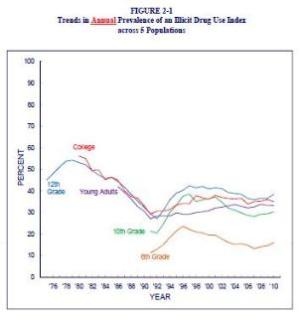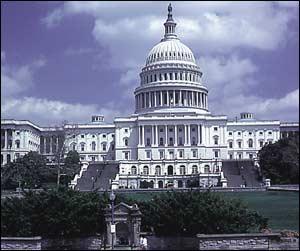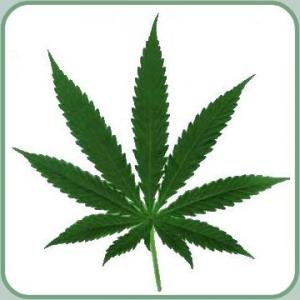The annual Monitoring the Future survey of high school students find cigarette and alcohol use down, but marijuana use up.
Republicans in Congress are pushing to reinstate a ban on use of federal AIDS funds for needle exchange programs. If they succeed, if won't reduce federal spending, but it will kill people. Please call today to tell Congress and the President to say no.
We are pleased to announce our newest offer for donating members, the recent Prohibition documentary by Ken Burns and Lynn Novick made for PBS. These three disk sets include 90 minutes of bonus footage not available on the web site or shown on TV.
As expected, the House of Representatives has passed a bill banning synthetic stimulants and cannabinoids. On the positive side, 98 members voted against responding to the drugs with a new prohibition.
Busy, busy, busy. Here's this week's medical marijuana news digest.
Mass murders in Ciudad Juarez and the Comarca Lagunera, and the army killed 11 cartel gunmen in Tamaulipas. Just another week in Mexico's prohibition-related violence.
Marijuana legalization gets strong support in polls in Colorado and Massachusetts, but not enough for activists to rest easy.
Arizona Gov. Jan Brewer has decided the state will argue in federal court that federal law preempts the dispensary provisions in the state's voter-approved medical marijuana law.
A Republican congressman from Georgia has introduced a bill that would mandate drug screening assessments for unemployment applicants and drug tests for those assessed as having a "high probability" of being drug users. But he cited only apocryphal evidence for any need for such legislation.
Spain's Basque County Autonomous Community is on course to legalize marijuana early next year.
A new law allowing prosecutors to divert small-time drug possessors into treatment instead of prison went into effect Friday.
A 24-year-old California man is dead after a shootout during an attempted drug bust, and a local gang is vowing revenge.
A Virginia sheriff gets raided, a sleazy Michigan cop gets busted, a New Jersey cop gets convicted, and several Oklahoma lawmen are headed to prison.
Events and quotes of note from this week's drug policy events of years past.
The annual Monitoring the Future survey of substance use by eighth, 10th, and 12th graders was released Wednesday, and it shows students are drinking and smoking tobacco at historically low levels, but marijuana use is on the rise. Teen use of other drugs also generally declined, except for a slight increase in use of prescription drugs reported by seniors.
About one-third of seniors reported smoking pot during the past year, up slightly from the previous year. That's well above the 20% who did so in 1991, the nadir for teen marijuana use, but well below the more than 50% who did so in 1979, the apex of teen marijuana use. The number of seniors reporting annual pot use has been creeping up slightly since about 2007.
Federal drug war bureaucrats bemoaned the uptick in teen pot smoking at a Washington, DC, press conference rolling out the research results, but marijuana law reform activists had a different take on the numbers and what they mean.
Daily tobacco smoking by teens was down by 50% compared to the
mid-1990s, while adolescent binge drinking had declined by 25% since 1997. About 10% of high school seniors reported daily cigarette smoking and about 20% reported smoking within the last month, down 40% from 1997. At all three grade levels, more students smoked pot in the last month than smoked cigarettes.
"The decrease is very dramatic," said Dr. Nora
Volkow, director of the National Institute on Drug Abuse. "But despite the dramatic results, the prevalence of teen smoking and drinking is still high, so we can't become complacent. The troublesome news is that marijuana use has been trending upwards in the last few years. We've seen a significant decline in the perception that marijuana is risky. Fewer kids see smoking marijuana as having bad health effects."
While careful to point out that responsible marijuana reform activists do not encourage teen substance use, Mason
Tvert, head of the activist group
SAFER (Safe Alternatives for Enjoyable Recreation) and coauthor of
Marijuana is Safer: So Why Are We Driving People to Drink? dared to suggest that young people who do use drugs are making smarter choices about which drugs they choose to use.
"We're always concerned about young people using drugs, but it's clear that more young people are understanding that marijuana is a less harmful substance and making that choice," said
Tvert. "While we certainly don't want to promote marijuana use among minors, this report suggests they are making the safer choice to use marijuana rather than alcohol."
Tvert attributed both the rise in teen use and the decline in their perceptions of marijuana's risks to their increasing exposure to knowledge about marijuana.
"Ultimately, people are hearing more and more about the facts surrounding marijuana, and as they continue to hear that marijuana is far less harmful than alcohol, that it doesn't contribute to violence, that there is no danger of a deadly overdose, they are increasingly more comfortable making that choice."
Drug czar Gil
Kerlikowske used the Wednesday press conference to blame medical marijuana for the rise in teen pot smoking.
"These last couple years, the amount of attention that's been given to medical marijuana has been huge," he said. "And when I've done focus groups with high school students in states where medical marijuana is legal, they say, 'Well, if it's called medicine and it's given to patients by caregivers, then that's really the wrong message for us as high school students.'"
While
Volkow and
Kerlikowske lauded the use of prevention campaigns in reducing teen smoking and drinking, they did not say why such a strategy was not appropriate for marijuana, nor did they break with the prevailing prohibitionist approach to marijuana. That led to criticism from the
Marijuana Policy Project (
MPP) and the
Drug Policy Alliance (
DPA).
"This report, once again, clearly demonstrates that our nation's policymakers have their heads buried in the sand when it comes to addressing teen marijuana use," said Rob
Kampia,
MPP executive director. "Political leaders have for decades refused to regulate marijuana in order to keep it out of the hands of drug dealers who aren't required to check customer ID and have no qualms about selling marijuana to young people."
"The continued decline in teen tobacco and alcohol use is proof that sensible regulations, coupled with honest, and science-based public education can be effective in keeping substances away from young people,"
Kampia continued. "It's time we acknowledge that our current marijuana laws have utterly failed to accomplish one of their primary objectives -- to keep marijuana away from young people -- and do the right thing by regulating marijuana, bringing its sale under the rule of law, and working to reduce the easy access to marijuana that our irrational system gives teenagers."
"The decline in cigarette smoking is great news -- not just because it's the most deadly drug but also because it reveals that legal regulation and honest education are more effective than prohibition and
criminalization," said
DPA publications manager Jag Davies. "It's absurd, though, that the survey doesn't also include the fiscal, health and human costs of arresting more than 1.6 million Americans each year on drug charges, including more than 750,000 for marijuana possession alone."
"Rather than measuring success based on slight fluctuations in drug use, the primary measure of the effectiveness of our nation's drug policies should be the reduction of drug-related harm," Davies continued. "A rational drug policy would prioritize reducing the problems associated with drug misuse itself -- such as overdose, addiction and disease transmission -- and the problems associated with drug prohibition, such as mass incarceration, erosion of civil liberties, and egregious racial disparities in enforcement, prosecution and sentencing. Looking at use rates in a vacuum is missing the forest for the trees."
"Arresting people for marijuana simply does not stop young people from using it, and it never will," said
Kampia. "It is time for a more sensible approach."
back to top
Dear drug policy reformer:
One of the most important actions taken by Congress in recent years was the lifting of a ban on the use of federal AIDS grants to support needle exchange programs. We have just learned that as part of the end-of-year Congressional spending package, Republicans are pushing hard to reinstate the ban. If they succeed, it won't reduce federal spending -- this is entirely about the choices state and local officials get to make with the funds that they have -- but it will kill people by promoting syringe sharing by injection drug users and the resulting spread of deadly diseases like Hepatitis and HIV, in turn driving up health care costs related to those diseases.
Please call the White House to urge President Obama to stand firm on this issue and not allow the needle exchange funding ban to be reinstated. The White House comment line number is (202) 456-1414. Here is a sample script for your phone call: "My name is _______. I live in <CITY, STATE>. Thank you for your past support of syringe exchange. I support maintaining current language that allows local officials to make their own decisions to use federal and local Washington DC funds for Syringe Exchange. Please do not allow the Senate or House to change the current law in the Fiscal Year 2012 Appropriations negotiations. Thank you."
Please also make the following calls to Congress:- Senate Majority Leader Harry Reid (D-NV): (202) 224-3542
- Senate Assistant Majority Leader Richard Durbin (D-IL): (202) 224-2152
- Charles Schumer, chair of Senate Democratic Policy Committee (D-NY): (202) 224-6542
- Your Own Two Senators: (202) 224-3121 for the Congressional Switchboard or look up your Senator's numbers at senate.gov
Sample script for phone calls to the Senate: "My name is _______. I live in <CITY, STATE>. I support maintaining current language that allows local officials to make their own decisions to use federal and local Washington DC funds for Syringe Exchange. Please do not change the current law in the Fiscal Year 2012 Appropriations negotiations. Thank you." - House Democratic leader Nancy Pelosi (D-CA): (202) 225-4965
"Thank you for your past support of syringe exchange. "My name is _______. I live in <CITY, STATE>. I support maintaining current language that allows local officials to make their own decisions to use federal and local Washington DC funds for Syringe Exchange. Please do not change the current law in the Fiscal Year 2012 Appropriations negotiations. Thank you."
Please email us to let us know what phone calls you've made -- especially if the staffers who take your phone calls offer any indication as to what their bosses' intentions are. Thank you for your taking action.
back to top
Dear Drug War Chronicle reader:
I am pleased to announce our newest offer for donating members, the recent
Prohibition documentary by Ken Burns and Lynn
Novick made for PBS.
These three disk sets include 90 minutes of bonus footage not available on the web site or shown on TV. Read Phil Smith's film review of
Prohibition in
Drug War Chronicle here.
Donate $50 or more to StoptheDrugWar.org and you will be eligible to receive a complimentary of Prohibition. Click here to make a donation online by credit card or PayPal. You can also donate by mail -- info below.
(If you've donated recently and are disappointed you didn't get to ask for a copy of
Prohibition with your donation, please let us know -- we'll be glad to send you a copy if you've donated $50 or more in the last few months, or to combine a smaller donation you've made with a new donation for the difference to qualify you for the offer.)
Please note that even with a nonprofit, bulk discount, we are spending nearly $25 per copy to purchase these and send them to you -- if you can afford to donate more than $50, or to supplement your $50 donation with a small, continuing monthly donation, I hope you'll consider doing so. If gift items are not important to you, I hope you'll consider sending a donation that's entirely for our work.
Dozens of StoptheDrugWar.org supporters have contributed to our organization in recent months to help us secure and prepare our programs for the new year -- thank you! Copies of the email messages they responded to are online:
click here to read our appeal for support for our blog and our online legislative center;
click here for more information on what the legislative center does for our efforts, and
click here for some reasons to support the
Drug War Chronicle newsletter.
Donations to our organization can be made online at
http://stopthedrugwar.org/donate, or they can be mailed to:
DRCNet Foundation (tax-deductible), P.O. Box 18402, Washington, DC 20036; or Drug Reform Coordination Network (non-deductible for lobbying), same address. (Contact us for information if you wish to make a donation of stock.) Be sure to indicate if you are requesting
Prohibition and whether you'd like DVD or
Blu-ray.
Thank you for standing with us to stop the drug war's cruelties and meet the opportunity this time offers to make a brighter future. And don't get discouraged by the challenges our movement and the cause are currently facing:
Time, and the truth, are on our side!
Sincerely,

David Borden, Executive Director
StoptheDrugWar.org
Washington, DC
http://stopthedrugwar.org
back to top
The House of Representatives voted last Thursday to pass HR 1254, the Synthetic Drug Control Act of 2011, which would criminalize not only synthetic stimulants ("bath salts"), but also synthetic cannabinoids ("fake pot") marketed under names such as "K2" and "Spice."
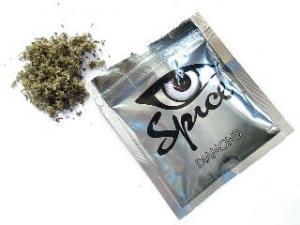
Spice and other synthetic cannabinoids and stimulants will be banned under the bill passed by the House (wikimedia.org)
The bill passed on a
roll call vote of 317-98. Sixteen Republicans joined with 82 Democrats to vote against the prohibitionist measure.
At least 40 states have passed bans on the new synthetic drugs, and the DEA has placed both fake pot and bath salts under emergency bans. The bill would make both sets of substances Schedule I drugs under the Controlled Substances Act, which would pose substantial impediments to researching them. Scientists have warned Congress that placing the synthetic drugs under Schedule I will have a chilling effect on ongoing efforts to explore treatments for a range of diseases and disorders.
Under the bill, prison sentences of up to 20 years could be imposed for the distribution of even small quantities of the new synthetics.
Seeking some small solace in the wake of the vote, Bill Piper, national affairs director for the
Drug Policy Alliance, which had lobbied to defeat the bill, said it was "significant" that nearly a hundred members of the House had broken with drug war orthodoxy to vote against the bill.
back to top
So much is going on in the world of medical marijuana that we cannot adequately cover it all through news briefs and the occasional feature article. The news briefs and feature articles will, of course, continue, but we now include a weekly medical marijuana update at least noting all those stories we are unable to cover more comprehensively. Here's the second one:
National
Last Friday, responding to questioning from Rep. Jared Polis (D-CO), Attorney General Eric Holder reiterated the Justice Department's support for its 2009 Ogden memo, which said the use and sale of medical marijuana in states where it is legal should be a low priority for federal prosecutors.
"What we said in the memo we still intend, which is that given the limited resources that we have, and if there are states that have medical marijuana provisions... if in fact people are not using the policy decision that we have made to use marijuana in a way that's not consistent with the state statute, we will not use our limited resources in that way," Holder said. "Where a state has taken a position, has passed a law and people are acting in conformity with the law -- not abusing the law -- that would not be a priority with the limited resources of our Justice Department," Holder said.
Arizona
Last Friday, a former nurse fired from Verde Valley Community Hospice because she is a medical marijuana user filed a lawsuit seeking damages in Maricopa County Superior Court. Arizona's medical marijuana law contains an anti-discrimination provision that says an employer may not make decisions on hiring, firing or discipline based on the person's status as a registered medical marijuana patient. The law even says that a positive drug test for marijuana from someone who is a registered user cannot be used against that employee unless the person either used, possessed or was impaired at the worksite. This case will be the first test of that law.
On Monday, a US district court judge harshly criticized the state's medical marijuana lawsuit, saying Arizona had to pick a side in the conflict over state and federal law. Judge Susan Bolton did not dismiss the case, saying she would issue a ruling later, but she told state attorneys she would throw it out unless the state decides whether or not to support its own law. Gov. Jan Brewer (R) filed the lawsuit in May, stalling the state's medical marijuana dispensary permit process.
On Wednesday, responding to the court's criticism, Gov. Brewer decided the state will argue that federal law preempts the state medical marijuana law and ask Judge Bolton to rule the state cannot regulate and permit medical marijuana dispensaries.
California
On December 7, the Live Oak City Council voted to ban residents from growing their own medical marijuana. The council cited "an unbearable stench and fear of violence." A final vote on the ban is set for next week, and the ban would take effect 30 days after that, on January 20.
On December 8, the La Puente City Council voted to order one dispensary shut down and gave another until February to show that it has not recouped costs of opening. The city banned medical marijuana dispensaries last year, but allowed some to continue operating temporarily during an amortization period while they attempt to recoup their investment costs.
On December 8, a Pomona police SWAT team raided the Natural Remedies dispensary. Police had a search warrant. A Rialto man was arrested on suspicion of possession of marijuana for sale. Police seized a pound of weed, cash, and weapons.
Last Friday, the Marin Alliance for Medical Marijuana announced it would close its doors as of this weekend. MAMM, the state's oldest dispensary, had been targeted by federal prosecutors. Another Marin County collective, Medi-Cone, shut down last week because of scrutiny by federal authorities.
On Tuesday, the Shasta County Board of Supervisors unanimously adopted an ordinance banning medical marijuana dispensaries in unincorporated parts of the county and narrowly passed a second law hours later regulating pot growth for county residents. The cultivation ordinance bans growing inside residences, but allows it in detached accessory structures and sets limits for outdoor growing regardless of how many patients live at a residence.
On Tuesday, the Mendocino County Board of Supervisors voted unanimously Tuesday to support the idea of lifting federal marijuana prohibition for states that have marijuana laws in place. "Inconsistencies in local, state and federal law create challenges within our public safety system network and criminal justice system. There are a record number of ballot initiatives in the coming election cycle calling for the legalization of marijuana. Mendocino County supports the regulation, legalization, and taxation of marijuana," the supervisors said.
On Tuesday, the Lake County Board of Supervisors voted to close all dispensaries in the county's jurisdiction. The board had approved an ordinance allowing up to five dispensaries in August, but that ordinance was overturned after advocates began a referendum petition to undo it. Supervisors then voted to rescind the ordinance, making dispensaries illegal in the county. The 10 dispensaries in the county will have 30 days to shut down.
On Tuesday, the Humboldt County Board of Supervisors approved a temporary moratorium on new dispensaries. The board cited uncertainty about whether local governments can regulate dispensaries in the wake of the Pack vs. Long Beach case, in which the court held that federal law preempted Long Beach's right to regulate marijuana. The moratorium will not affect the county's three existing dispensaries.
On Tuesday, the Riverside County Board of Supervisors voted to authorize its attorneys to sue any dispensaries in unincorporated areas of the county unless they close immediately. The county has banned dispensaries from operating in unincorporated areas of the county since 2006. Nonetheless, county officials estimate that at least 36 dispensaries are open in violation of the ban.
Colorado
Colorado Gov. John Hickenlooper (D) will not join fellow governors Lincoln Chafee (I) of Rhode Island, Christine Gregoire (D) of Washington, and Peter Shumlin (D) of Vermont in petitioning the federal government to reschedule marijuana, but the state of Colorado will independently seek rescheduling. Colorado's medical marijuana law requires the Colorado Department of Revenue to make the same request of the feds by no later than January 2012. State officials said that will be done.
The number of registered medical marijuana patients has declined dramatically from its peak of more than 128,000 in June. As of the end of October, the state's registry showed only 88,000 patients. It's unclear what the decline means. Some patients could be dropping out temporarily because registration costs will drop next year, but the state has at least 4,200 applications on hold because of problems with doctors' signatures, and 30,000 applications were in the system as of the end of last month.
Michigan
Last Friday, state and local police raided three medical marijuana dispensaries in Tuscola, Sanilac and St. Clair counties Friday for alleged involvement in the the illegal trafficking of marijuana. They included the Blue Water Compassion Center and a private residence in Kimball Township, as well as Blue Water Compassion Centers in Denmark Township in Tuscola County and Worth Township in Sanilac County. Police confiscated marijuana and marijuana-laced tinctures, topical oils, capsules, and medicated edibles. Patient files, money and toys donated to Toys for Tots also were taken, but no arrests were made. The three centers are owned by Jim and Debra Amsdill. Combined, the centers have about 26 staff and roughly 3,500 members.
New Jersey
Last Friday, the state Agriculture Development Committee ruled that medical marijuana may be grown and processed on preserved farms. Preserved farms are areas designated only for agricultural usage. The committee's move came after residents of Upper Freehold implored it not to recognize medical marijuana as an agricultural crop allowed on preserved farmland. They also criticized the process that allowed a federally outlawed drug to be grown and distributed here in the first place. The Breakwater Alternative Treatment Center has expressed interest in at least five properties in Upper Freehold as sites for growing medical marijuana, and some of them are preserved farms.
back to top
by Bernd Debusmann Jr.
Mexican drug trafficking organizations make billions each year smuggling drugs into the United States, profiting enormously from the prohibitionist drug policies of the US government. Since Mexican president Felipe Calderon took office in December 2006 and called the armed forces into the fight against the so-called cartels, prohibition-related violence has killed around 40,000 people, including more than 15,000 last year. The increasing militarization of the drug war and the arrest or killing of dozens of high-profile drug traffickers have failed to stem the flow of drugs -- or the violence -- whatsoever. The Merida initiative, which provides $1.4 billion over three years for the US to assist the Mexican government with training, equipment and intelligence, has so far failed to make a difference. Here are a few of the latest developments in Mexico's drug war:
Wednesday, December 7
In
Ciudad Juarez, a
total of 13 people were murdered. This includes four (reported last week) that were killed when gunmen rammed and attacked an ambulance with automatic weapons.
In the
Comarca Lagunera area (which encompasses the cities of
Torreon, Gomez
Palacio and
Ciudad Lerdo)
at least 10 people were murdered. Seven of the dead were discovered stuffed into a VW
Jetta parked in an industrial park. One person -- reportedly a Gomez
Palacio police woman -- was found alive in the car and taken to a local hospital.
In
Ciudad Juarez, an
active-duty US army soldier and two others were arrested after an armed robbery at a gas station. Authorities later said that they later took responsibility for the killings of four
Ciudad Juarez police officers this year.
Thursday, December 8
In
Ciudad Mier,
Tamaulipas,
President Calderon formally inaugurated a new military barracks. In late 2010, most of the city was abandoned after civilians fled intense fighting between the
Zetas and Gulf Cartel. The new barracks can house up to 600 troops. The army has taken over police functions in the area to allow local police to recruit and train new members.
Friday, December 9
In
Nogales,
the army discovered a 50-yard long tunnel. It is unclear if the tunnel was completed on the American side of the border. One armed man was detained at the scene.
Saturday, December 10
In Valle
Hermoso,
Tamaulipas,
11 gunmen were killed in a fire fight with Mexican soldiers. One soldier was wounded in the exchange of gunfire, which began when troops on patrol came under fire from a building. Valle
Hermoso is just south of the Texas border town of Brownsville.
Sunday, December 11
In Veracruz,
the former mayor of the town of Ixhuacan de los Reyes and three relatives were gunned down during an attack on the family's business. Two weeks previously, a
firefight between gunmen and the army left four people dead.
In the city of Veracruz, one person was killed and nine others wounded in a grenade attack on an underground cockfighting ring.
Monday, December 12
In Cordoba, Veracruz,
marines captured a high-ranking Zeta member. Raul
Lucio Hernandez
Lechuga, "El Lucky" is a founding member of the
Zetas and is thought to be the area boss for Veracruz, Puebla and Oaxaca.
Authorities later said he was found to be in possession of a large arsenal of firearms totaling 169 guns as well as 29 grenades. One suspect was killed and a marine was wounded in the operation.
[Editor's Note: We have been conservatively estimating Mexican drug war deaths this year after El Universal quit publishing a box score. As of mid-November, we had estimated 8,100 deaths so far this year, but in light of new figures have revised that figure upward by about 3,000 deaths. Even that figure is an estimate, no more, until there is some official toll reported.]
Total Body Count for 2007 (approx.): 4,300
Total Body Count for 2008 (
approx.): 5,400
Total Body Count for 2009 (
approx.): 9,600
Total Body Count for 2010 (official): 15,273
Total Body Count for 2011 (approx.): 11,600
TOTAL: > 45,000
back to top
Two polls released late last week show strong support for marijuana legalization in Colorado and Massachusetts. Both states have already decriminalized the possession of small amounts of pot, and activists in both states are working toward legalization. In Colorado, an effort to put a legalization initiative on the ballot next year is well underway, while in Massachusetts, this year's emphasis is on legalizing medical marijuana.
In Massachusetts, a
DAPA Research poll conducted for the
Massachusetts Cannabis Reform Coalition/NORML found that 58% support legalizing marijuana and regulating it like other agricultural commodities with sales prohibited to underage persons. The figure was 69% for Democrats, 44% for Republicans, and 54% for "other."
Support for legalization rose to 62% when respondents were asked if a proposed law would tax and regulate the cultivation and distribution of marijuana to adults like the state currently regulates alcohol. The figure was 70% for Democrats, 56% for Republicans, and 60% for "other."
The poll also found that 54% opposed the federal government disregarding state laws in states that legalize marijuana, while only 35% supported the federal government disregarding state law.
The Massachusetts poll was conducted in November. It surveyed 600 Massachusetts voters by telephone and has a margin of error of +/-4%.
"The data strongly suggests that Massachusetts voters are more ready than voters in any other state to end prohibition and establish reasonable regulation of cannabis cultivation and commerce for all purposes," said Steven Epstein, a founder and currently an officer of
MassCann/
NORML. "The data also establishes that if the legislature does not enact a law allowing medical use of marijuana this session the voters will overwhelmingly, perhaps 80%+, approve the voter initiative for the
Humanitarian Medical Use of Marijuana at the ballot box in November."
"Legalization is essential to ending crime created by the prohibition of cannabis," said Cara Crabb-Burnham, a member of MassCann/NORML's board of directors. "It is important to recognize legal vendors will card customers and keep it out of the hands of children."
In Colorado, a
Public Policy Polling survey asked "in general, do you think marijuana usage should be legal or illegal," and legal won by a margin of 49% to 40%. A similar question about medical marijuana showed support at 68%, with only 25% saying it should be illegal. No cross tabs were available for the poll.
The poll surveyed 793 Colorado voters from December 1 to 4. The margin of error for the survey is +/-3.5%. It was conducted via automated telephone interview.
The poll sends a mixed message for Colorado legalizers. It demonstrates that marijuana legalization is more popular than pot prohibition in the Rocky Mountain State, but not quite popular enough to win at the polls next year. The conventional wisdom among initiative experts is that they should be polling at 60% or above before the campaign begins.
But Art Way, Colorado manager for the
Drug Policy Alliance, told the
Colorado Independent said he had seen polls showing stronger support than this one and that it was early yet. "I think it will go higher as the campaign heats up," he said.
back to top
Gov. Jan Brewer (R) decided Wednesday to ask a federal judge to throw out a central component of the state's voter-approved medical marijuana law. The decision came just two days after a federal judge threatened to dismiss Brewer's lawsuit seeking clarity about medical marijuana regulations if the state did not take a position on whether it can implement the law despite federal statute or whether federal law preempts it.

No dispensaries for Arizona if Gov. Brewer has her way. (wikimedia.org)
Gubernatorial press aide Matthew Benson told
Capitol Media Services that Brewer is now taking the position that federal law preempts a provision in the law that requires the state to regulate and permit more than 100 medical marijuana dispensaries. The state will ask US District Court Judge Susan Bolton to rule that Arizona cannot process dispensary applications.
"She does support the will of the voters," Benson said, even though she opposed last year's successful initiative. "But she also has to look out for the well-being of her state employees. No state employee should be put in a position where they could face federal prosecution simply for doing their jobs."
Joe
Yuhas, spokesman for the
Arizona Medical Marijuana Association, which led last year's campaign, slammed the governor's decision. "That's unfortunate," he told Capitol Media Services. "I also think it's somewhat ironic that a state government that seems to continuously question federal preemption, whether it's health care or immigration, now runs behind that shield in an effort to thwart the will of the voters."
He added that the whole federal lawsuit seeking clarification is a waste of time and money. While Arizona's law, like those in other medical marijuana states, differs with the Controlled Substances Act in allowing medical marijuana use and distribution under state law, no state or local official anywhere has been prosecuted for undertaking actions to regulate medical marijuana in states where it is legal, he noted.
The Arizona law lets persons with specified medical conditions obtain and possess up to 2 ½ ounces of marijuana per week. Some 16,000 people have registered to do so. Brewer is not seeking to invalidate that part of the law.
The law as approved by voters only allowed patients or caregivers to grow their own if they were located more than 25 miles from a dispensary. But if Arizona ends up with no dispensaries, any patient could grow his own.
back to top
A Republican congressman from Georgia has filed a bill that would require applicants for federally funded unemployment benefits to do a drug screening questionnaire. Those who are identified as having a high probability of using drugs would have to pass a drug test in order to receive benefits and they would be subject to random drug tests while receiving benefits.
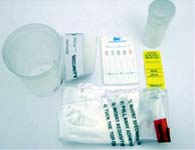
drug testing paraphernalia
Last week, Rep. Jack Kingston introduced
HR 3601, the Ensuring the Quality of Unemployment Insurance Program (EQUIP) Act, portraying it as a money-saving measure for the cash-strapped federal government.
"Drug screening as a condition of unemployment benefits safeguards valuable taxpayer dollars by ensuring job seekers are at their competitive best for re-employment and helps to reduce the nation's debt by not using federal resources to enable an individual's drug dependency," Kingston said in a letter to colleagues seeking their support.
But he only cited only apocryphal evidence that drug use among unemployment recipients is a problem worthy of federal legislation.
"I had an employer tell me of an overwhelming response for job openings,"Kingston said in a
press release announcing the introduction of the bill. "There was just one problem: Half the people who applied could not even pass a drug test. While we need a safety net, taxpayers should not be on the hook to pay someone who renders themselves ineligible for work. My proposal further
incentivizes beneficiaries to ensure they are preparing themselves to re-enter the workforce."
The federal courts have held that drug testing is a search requiring probable cause and have limited drug testing to certain sensitive law enforcement and public safety positions. Kingston's bill would seek to get around that obstacle by using the drug screening assessment to establish which applicants have a "high probability" of being drug users.
Still, the bill is generating harsh criticism from Democrats and employment law experts.
"This is just another attempt to demonize the unemployed, most of whom have no job for no fault of their own," Rep. George Miller (D-CA), top Democrat on the House Committee on Education and the Workforce told the
Los Angeles Times. "Why doesn't he propose to drug test executives at Wall Street banks? It was their actions that have been documented to have directly contributed to the recession and high unemployment rate in the first place."
"There is no reason to single out the unemployed as a particular category that is more likely to be abusing drugs," said George Wentworth, senior staff attorney at the
National Employment Law Project. "There is no justification for it. The vast majority of unemployed Americans have fallen on hard times and are looking hard for another job. With long-term unemployment at record levels, Congress should be focused on renewing federal unemployment benefits, not devising new ways to insult American families struggling to hold it together until they can find that next job," Wentworth said.
The bill has so far garnered just one cosponsor, Rep. Blake
Farenthold (R-TX). It now goes before the House Ways and Means Committee and the House Energy and Commerce Committee.
back to top
The parliament of Spain's Basque Country Autonomous Community will approve a new drug law early next year that will regulate marijuana cultivation, distribution, and consumption, EFE reported Tuesday.
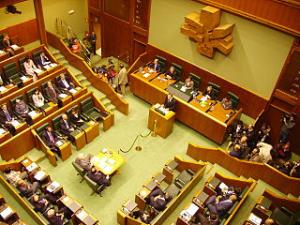
the Basque parliament in Vitoria-Gasteiz (wikimedia.org)
The Basque Country Autonomous Community is charged with setting and enforcing domestic law within its borders in northeastern Spain. If the bill passes, it would mark a direct challenge to the United Nations' 1961 Single Convention on Narcotic Drugs, which forbids legalization.
"It's better to regulate than to ban," said Jesus Maria Fernandez, second in command at the region's health authority. Regulating "the growing, sale, and consumption of cannabis" is a better approach to pot smoking, he said, calling it "a practice that is already consolidated."
Regional health authority head Rafael
Bengoa echoed his subordinate's words. "We do not want to be prohibitionists," he said.
Bengoa added that "technical and legal studies have been undertaken" and that the regional government wants to "open a debate" with groups representing marijuana users to help "shape their rights."
The pending bill also includes measures for prevention and treatment not only of drug addiction, but also addictions to gambling and new technologies.
back to top
An amendment to Poland's drug law that allows prosecutors to divert drug users to treatment instead of prison went into effect last Friday, PolskieRadio reported.

This crack smoker could get treatment instead of jail under a new Polish law (image via wikimedia.org)
The amendment lets prosecutors bypass the courts in a "treat, not punish" approach to drug use when confronted with people arrested in possession of small amounts of drugs. A person arrested with personal use quantities of drugs can now be immediately referred to a therapist, and prosecutors are compelled to gather information on the extent of the person's drug problem.
National Bureau for Drug Prevention spokeswoman Barbara Wilamowska told
PolskieRadio she believes the new approach will result in fewer prosecutions.
Agnieszka Sieniawska, head of the Polish Drug Policy Network (
PSPN), said the new system will be quicker, cheaper and more efficient.
But while the amendment represents a kinder, gentler approach to drug users, that same law increases penalties for drug trafficking.
The amendment comes into effect a month after two Polish Nobel Prize laureates, former president Lech Walesa and poet
Wislawa Szymborska, signed a statement calling for lighter punishments for those arrested for personal use.
Meanwhile, a newly formed liberal political party, Palikot's Movement, is calling for the full legalization of soft drugs. It won a surprising 10% of the vote in the October general election. But Prime Minister Donald Tusk, head of the current coalition government, has said that his Civic Platform Party opposes legalization.
back to top
[Editor's Note: Drug War Chronicle is trying to track every death directly attributable to domestic drug law enforcement during the year. We can use your help. If you come across a news account of a killing or death related to drug law enforcement, please send us an email at [email protected].]
A Santa Maria, California, man was shot and killed and two officers were wounded in a December 8 drug bust gone bad. Samyr Ceballos, 24, becomes the 48th person to die in US domestic drug law enforcement operations so far this year.
Police told KION-TV that Ceballos was under surveillance as part of a drug investigation, and officers followed him to his home Thursday morning. Ceballos was tazed after he refused a command to get out of his SUV, but police said he got back up and drew his firearm, and the shootout began.
Ceballos was pronounced dead at the scene. Two officers were hit, one in the hand and the other in the leg. They have been treated for their injuries and released. Police are not releasing their names because threats against them have been made by the West Park Street Gang.
"We will not back down. Let me tell you, we will not," said Santa Maria Police Chief Danny Macagni. "It's not a good thing to threaten police, especially from a criminal street gang. We don't negotiate with those people, and we'll handle those threats accordingly."
The drug investigation is ongoing. Police said Ceballos had a lengthy criminal history, including burglary, assault, armed robbery, and multiple drug violations.
back to top
A Virginia sheriff gets raided, a sleazy Michigan cop gets busted, a New Jersey cop gets convicted, and several Oklahoma lawmen are headed to prison. Let's get to it:
In Halifax, Virginia,
Virginia State Police served a search warrant at the Halifax County Sheriff's Office December 5 in an ongoing embezzlement investigation of Sheriff Stanley
Noblin. State Police seized documents, a bank statement, and several computers, including a binder titled "fiscal year asset forfeiture money" and a notebook titled "drug buy money." The search is part of an investigation requested by state Attorney General Ken
Cuccinelli II into the disposition of $48,500 in asset forfeiture funds and $34,500 in drug buy funds for which no official use has been discerned.
In Benton Harbor, Michigan,
a Benton Harbor police officer was arrested December 8 on charges he forced a 24-year-old woman to perform fellatio on him to avoid being arrested for marijuana possession. Officer Jared Graves is charged with two counts of criminal sexual conduct in the third degree, one count of misconduct in office, and one count of delivery of marijuana. Graves allegedly was called to an apartment complex on a drug use complaint and confiscated marijuana from the woman. Two days later, he told her to come to the police station to discuss the incident. He then forced her into oral sex and returned her marijuana. Weeks later, Graves met the woman at the apartment complex and compelled her to perform oral sex and engage in sexual intercourse, again threatening her with the marijuana offense.
In Camden, New Jersey,
one Camden police officer was convicted and another acquitted last Friday on charges they falsified reports, planted evidence, and stole money. Officer Antonio Figueroa, 35, was convicted on three of five counts of civil rights violations and conspiracy, while Office Robert
Bayard, 33, was acquitted of all charges. Both were members of the Camden Police Special Operations Unit, an elite crime-fighting team formed to crack down on drug dealing and violent crime in the city. Three other officers in the unit have already pleaded guilty to planting drugs on suspects and stealing cash discovered during searches. They had also been accused of lying to state grand juries and falsifying reports to bring unjustified criminal charges. Figueroa will be sentenced March 16.
In Oklahoma City, Oklahoma,
a former Oklahoma Bureau of Narcotics agent was sentenced December 5 to 35 months in federal prison after admitting his role in an operation to smuggle guns from Oklahoma to Texas, some of which ended up going to drug cartels in Mexico. Francisco Javier Reyes, 30, pleaded guilty last year to one count each of conspiracy and transferring firearms to an out-of-state resident as part of a plea agreement with prosecutors. He could have gotten up to 10 years.
In Tulsa, Oklahoma,
three former Tulsa police officers and a former ATF agent were sentenced December 6 after being convicted on drug corruption charges. Former officer Jeff Henderson got 3 ½ years in prison, former officer
JJ Gray got four months, retired officer Harold Wells got 10 years, and former ATF agent Brandon McFadden, who copped a plea and testified against the others, got 21 months. All were convicted in a long-running scandal involving false arrests, false reports, and other civil rights violations. Three other officers were acquitted, but remain off the job while Tulsa Police finish an internal investigation.
back to top
December 17, 1914: Congress passes the Harrison Narcotics Act, initiating federal prohibition of cocaine and opiates.
December 17, 1986: Guillermo
Cano Isaza, editor-in-chief of El
Espectador (Colombia), is assassinated while driving home from work.
Cano frequently wrote in favor of stiffer penalties for drug traffickers. His murder leads to a national outrage comparable to the assassination of Attorney General Rodrigo Lara
Bonilla, and a subsequent government crackdown on traffickers.
December 15, 1989:
Medellin cartel leader Jose Gonzalo Rodriguez
Gacha is killed by Colombian police in a raid on his
Tolu ranch.
December 20, 1989: The US invades Panama with 24,000 soldiers in Operation Just Cause in order to overthrow dictator Manuel
Noriega for drug trafficking, money laundering, and selling information to Cuba.
December 16, 1991: The US Supreme Court allows a US Court of Appeals ruling to stand which found that the government's interest in screening out possible drug users outweighed the applicant's constitutional right to privacy. Prior to this decision, only federal employees in occupations related to public safety (e.g. truck and bus drivers) could be tested without cause. The ruling opens the door to across-the-board drug testing for millions of businesses and was a boon to the drug testing industry.
December 18, 2002: 108 members of the European Parliament endorse a letter calling on the United Nations and its member states to establish a "system for the legal control and regulation of the production, sale and consumption of substances which are currently illegal."
December 19, 2003: Albert A. Gore III, 21, is arrested for marijuana possession after being stopped for driving a vehicle without its headlights on.
December 16, 2009: The execution of Arturo Beltran
Leyva, the "Boss of Bosses," and the death of 63 others marks a record one-day high in homicides in Mexico's drug war. In 2009 alone, an average of 25 people a day -- more than one an hour -- were killed.
back to top
